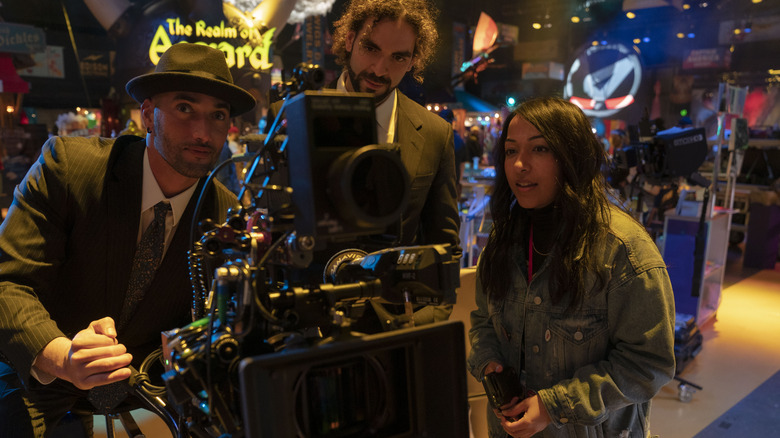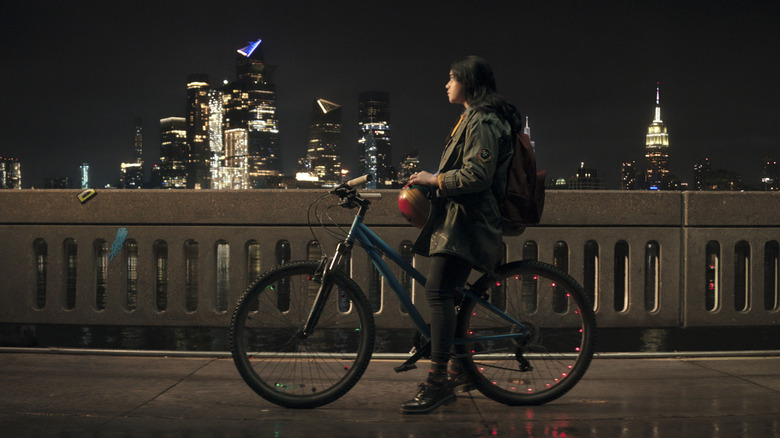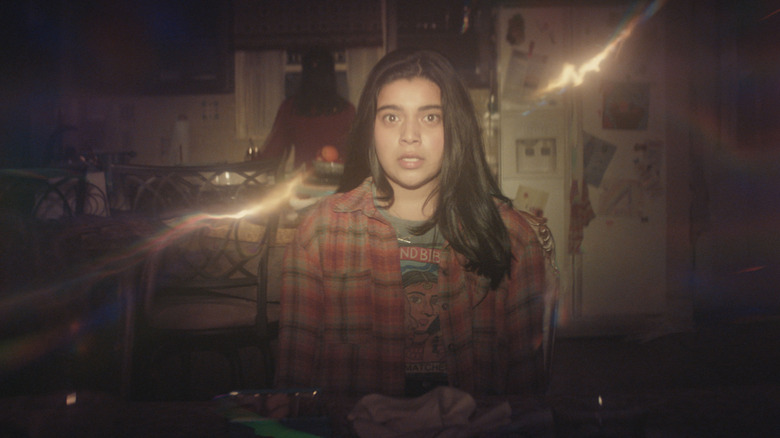Ms. Marvel Directors Talk Spider-Verse Inspirations And Infusing The Show With Color [Interview]
Kevin Feige and Marvel Studios have made a habit out of recruiting immensely talented up-and-coming talent for the various movies and shows set in the Marvel Cinematic Universe. At times, the conversation surrounding this hiring practice has taken on a somewhat negative tone: By steering clear of more veteran and experienced voices, it's easier for studio executives to impose their will on how they think the production ought to turn out. So goes the easy narrative, at least. While that may be true in certain high-profile cases over the years, the directing duo of Adil El Arbi and Bilall Fallah found themselves right at home in the high-stress and rapid-fire environment of streaming television on "Ms. Marvel."
After the success of "Bad Boys For Life" (not to mention the recent Cannes release of their follow-up, "Rebel"), both filmmakers likely had their pick of the litter when it came to choosing their next project. To the surprise of no one, Marvel came knocking at their door and obviously the two quickly accepted — with one key stipulation. If they were going to play in the Marvel sandbox, they wanted it to be with a Muslim character. Little did they know that Marvel had been working on that very thing, with Kamala Khan next on the docket for a live-action adaptation.
The Belgian directors of Moroccan background proved to be a natural fit for the high-energy entertainment of "Ms. Marvel," having managed to bring their own sense of style to the proceedings. Right from the opening moments of episode 1, El Arbi and Fallah quickly set the tone by incorporating thrillingly dynamic imagery of Kamala's drawings, text messages, daydreams, and other fantasies coming to life and invading the live-action elements of the show. When I had the chance to talk with both directors over Zoom, I asked them about what drew them to "Ms. Marvel," how they took inspiration from "Spider-Man: Into the Spider-Verse," and their strong use of color throughout the premiere episode.
This interview has been lightly edited for clarity.
'That makes it so distinctive and original'
It's such a big deal, to state the obvious, to have the first Muslim and another South Asian superhero in the MCU. So let's start there. How do you both deal with that pressure, that responsibility of doing this? Or do you have to treat it like this is just another character that you're doing, as you've done on movies in the past?
El Arbi: Well, it's a mix of both. I think that for us, after "Bad Boys For Life," when we were editing that movie, we thought, "What's the next step?" And the next step, it had to be Marvel [laughs]. It had to be part of the MCU, because they're the biggest in the biz. And we were joking around and saying that if we're going to be part of the MCU, it's going to have to be a Muslim character, not knowing that there was actually already a Muslim character they were working on. That's how we discovered Ms. Marvel and her world or universe. We fell in love with that character, her families, and friends. And it was just very relatable to our lives, being Moroccan Muslims in Belgium, maneuvering between those two worlds as teenagers, looking for your identity. Who do you belong to? What's your destiny? All that. It was just a coming-of-age story on a very personal, small level that was really relatable to us.
And then of course, it goes into the bigger MCU. The super powers come in and it just becomes something larger than life. So it was just a balance between telling that very close, personal story that, usually, that's how we take on all of our projects and then setting them in a ginormous environment.
In a press conference, you offhandedly mentioned that the animated effects in the live-action footage were at least partially inspired by "Spider-Man: Into the Spider-Verse." I was wondering if you could expand on that a little more.
El Arbi: Absolutely.
Fallah: Yeah. When we saw "Into the Spider-Verse," it was really like a milestone. We were like, "Ah, imagine if we could make a live-action version of that?" So for us, this was an opportunity, because Kamala Khan has this big fantasy world and there was a lot of dreams and doing that with the animation made it really clear and you could really get inside of her head. And it's also an homage to the comic book aesthetic. We were a bit afraid that Marvel wouldn't like it, because it's totally different than all the other Marvel shows. So we made this big presentation and we showed YouTube videos and then Kevin Feige said, "Yeah, all right. I like it. It's very good. You can do it, but not too much. Only use it for a good reason and it's really attached to the character and the story." And I think that makes it so distinctive and original, this show.
'The opening animation and the other elements were not in the script'
I thought one of the most pleasant surprises was, as you mentioned, how it incorporates Kamala's daydreams, her fantasies, even her drawings into live-action. How much free rein do you both feel that you had to do those kinds of flourishes? How much did you push the envelope to try to see what you could get away with?
El Arbi: Well, it's like Kevin said, you're pretty much free inside that world, inside the world of Ms. Marvel. But yeah, he was saying like, "Don't do it every five seconds because it would then lessen its powers." And I think it's good, that guidance of the producers saying, "Don't do it all the time." But yeah, we could do a lot of things. Like, the opening animation — all those elements were not in the script, so that's why we injected that. We wanted to have that stop-motion aspect to it. And we wanted to have the text messages that you have the environment changing, and when you're biking you have the murals and all that. And obviously the dream sequences, you know? And on that front, as long as it was true to story and the plot points and it didn't go overboard, we were allowed to do whatever we wanted. And it was a real pleasure to do that.
One of the things I thought the entire creative team got right with these first two episodes was the role that color plays into South Asian culture. Everything's bright, everything's vibrant, even more so than maybe other Marvel stuff. Did you purposely make an effort to incorporate that more and how did you do so?
El Arbi: Yeah.
Fallah: Yeah, definitely. If you look at the comic book, it's very vibrant and colorful and we really wanted to mimic that and really translate that on the screen. And also having that ethnicity in it, it's, for us, like Bollywood meets Hollywood [laughs].
El Arbi: Just so you know, I'm Moroccan background. If you see all the movies and shows we made, we love colors. Whether it's "Bad Boys For Life" where you have the colorful Miami, or "Snowfall," we have South Central in that colorful way. And all the Belgian movies we did, you see the connection between the Pakistani culture and the Moroccan culture, where you go there and that color pops, you know?
Fallah: It's a lot of spices, you know? A lot of spice [laughs].
El Arbi: A lot of spice [laughs].
New episodes of "Ms. Marvel" debut on Disney+ on Wednesdays.


